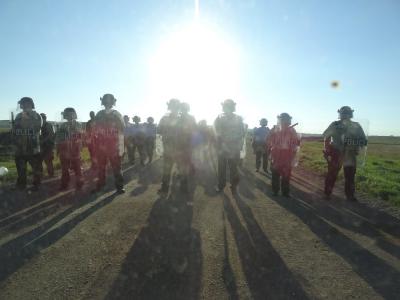-
Tips for becoming a good boxer - November 6, 2020
-
7 expert tips for making your hens night a memorable one - November 6, 2020
-
5 reasons to host your Christmas party on a cruise boat - November 6, 2020
-
What to do when you’re charged with a crime - November 6, 2020
-
Should you get one or multiple dogs? Here’s all you need to know - November 3, 2020
-
A Guide: How to Build Your Very Own Magic Mirror - February 14, 2019
-
Our Top Inspirational Baseball Stars - November 24, 2018
-
Five Tech Tools That Will Help You Turn Your Blog into a Business - November 24, 2018
-
How to Indulge on Vacation without Expanding Your Waist - November 9, 2018
-
5 Strategies for Businesses to Appeal to Today’s Increasingly Mobile-Crazed Customers - November 9, 2018
Dakota Access pipeline work stoppage request denied
A federal judge Friday denied a Native American tribe’s request for a temporary restraining order to halt construction on the controversial Dakota Access Pipeline. Native Americans are outraged that the pipeline crosses ancient burial and prayer sites.
Advertisement
District Judge Boasberg found that the U.S. Army Corps of Engineers had complied with the law in approving permits for the pipeline and that the tribe had not demonstrated that “irreparable harm will ensure”. “Aware of the indignities visited upon the Tribe over the last centuries, the Court scrutinizes the permitting process here with particular care”. South Dakota’s many tribes have joined together to oppose the pipeline, as they did with the Keystone XL pipeline.
Food and Water Watch mapped out the institutions that are bankrolling Dakota Access, LLC and its parent company, Energy Transfer Partners, and learned that the Standing Rock Sioux are pitting themselves against the financial interests of at least 17 firms that have loaned the company $2.5 billion to construct the pipeline.
The nearly 1,700-kilometre long pipeline would carry light sweet crude oil from the Bakken oilfield in North Dakota near the Canadian border to IL.
Energy Transfer fell 2.2 percent to $39.69 at 14:50 p.m.in NY.
The judge wrote that the U.S. Army Corps of Engineers “gave the Tribe a reasonable and good-faith opportunity to identify sites of importance to it”.
“My nation’s history is at risk because the pipeline builders and the Army Corps failed to consult the tribe when planning the pipeline, and routed it through areas of cultural and historical significance, which will be destroyed”, David Archambault II, chairman of the Standing Rock Sioux tribe, said in a court filing.
Tribal attorney Jennifer Baker says the lawsuit will take time, but that the Yankton Sioux wants to stand beside Standing Rock, Cheyenne River and other tribes because they share rights to the water and the land.
After the tribe specified to the court which area it considered to be sacred and historic, Dakota Access workers began to plow under those areas.
Morton County Sheriff Kyle Kirchmeier, who has been critical of protesters, said 37 people had been arrested to date at a construction site south of Mandan, N.D. He has also alleged that local residents were being harassed by protesters. A U.S. district judge temporarily stopped work on the pipeline and will rule Friday on the tribe’s challenge.
People have come from as far as NY and Alaska, as well as Canada. Meanwhile, the Great Plains Tribal Chairman’s Association has asked US Attorney General Loretta Lynch to send federal monitors to the protest, alleging racial profiling.
“People standing up against a $3.8 billion pipeline I just felt moved to come here”, she said.
It led to Saturday’s clash between protesters and private security guards hired by the pipeline company.
Green Party presidential candidate Jill Stein and running mate Ajamu Baraka camped with protesters Monday, and her campaign spokeswoman said Stein spray-painted construction equipment Tuesday. According to Dallas-based pipeline developer Energy Transfer Partners, “it will transport approximately 470,000 barrels per day with a capacity as high as 570,000 barrels per day or more – which could represent approximately half of Bakken current daily crude oil production”.
The federal agencies said they are inviting tribes to formal consultations this fall to address how the US government “can better ensure meaningful tribal input into infrastructure-related reviews and decisions and the protection of tribal lands, resources, and treaty rights”. The department did not respond to requests for comment. She said it would have been “inappropriate for me not to have done my small part” to support the Standing Rock Sioux. The tribe says this puts its drinking water and sacred lands at risk.
State authorities announced this week that law enforcement officers from across the state were being mobilized at the protest site, some National Guard members would work security at traffic checkpoints and another 100 would be on standby.
The tribe argues the project threatens water supplies and has already disrupted sacred sites.
Advertisement
A weekend confrontation between protesters and private security guards on private land near the protest site where tribal officials say construction workers bulldozed sacred sites left some guards injured and some protesters with dog bites.





























